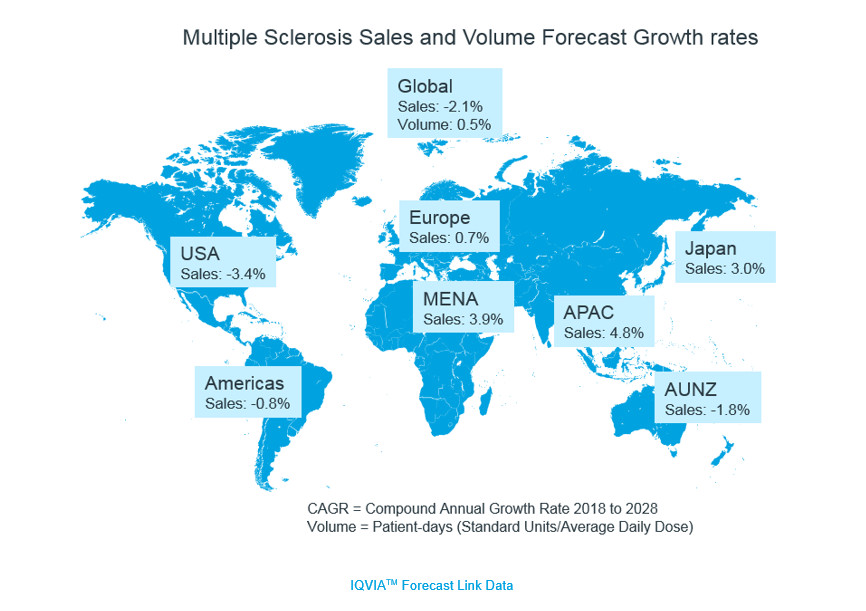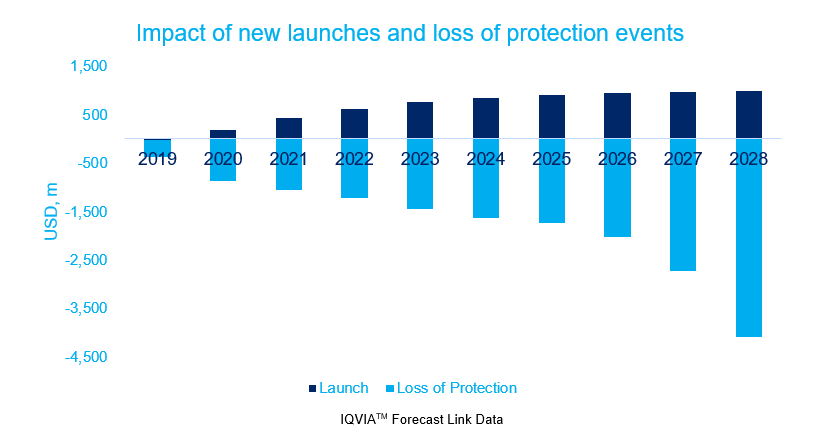





















- Blogs
- Multiple Sclerosis market slowed by generics and biosimilars, despite promising new therapies
What is Multiple Sclerosis?
Multiple Sclerosis (MS) is a chronic, inflammatory, immune-mediated, demyelinating disease of the central nervous system (CNS) which affects the brain, spinal cord, and optic nerves. The disease includes a multitude of functional symptoms such as abnormal gait, deficient balance, muscle weakness, spasticity and fatigue.
Although the cause is unknown, certain risk factors such as an association of genetic susceptibility and environmental agents have been implicated in its pathogenesis.
Types of Multiple Sclerosis
MS is a heterogeneous autoimmune disease which includes several subtypes with some features overlapping but with distinct prognosis. The major subtypes of MS are:
- Relapsing–Remitting Multiple Sclerosis (RRMS)
- Secondary Progressive Multiple Sclerosis (SPMS)
- Primary Progressive Multiple Sclerosis (PPMS)
- Rapidly Evolving Severe relapsing–remitting multiple sclerosis (RES)
Progressive forms of MS, which can also show relapses, are primarily distinguished from RRMS by the persistent accumulation of physical disability. Over time, patients initially diagnosed with RRMS may transition to SPMS, characterised by worsening symptoms with few or no relapses.
Therapy landscape of Multiple Sclerosis
Currently, there are no therapies that can cure MS but it is possible to control the disease with treatment, which can be broadly divided into three categories:
- treatment of symptoms
- treatment of acute exacerbations
- disease modifying therapies
The symptomatic therapies are aimed at treating bladder control, walking speed/ease, spasticity, ataxia, pain, and fatigue. Acute relapses or exacerbations are typically treated with corticosteroids, plasmapheresis, intravenous immunoglobulin, or adrenocorticotropic hormone.
The long-term management of MS patients, and the area of greatest innovation and revenue, revolves around treatment with disease-modifying therapies. These therapies are capable of reducing relapse frequency and, in some instances, delaying the accumulation of physical disability. Currently, there are over 12 disease-modifying therapies approved for use in relapsing forms of MS delivered intravenously, subcutaneously and orally.
Global and regional MS market forecasts
The MS market was worth USD$25.4 billion in 2018 and has grown at a CAGR of 4.8% since 2014 (IQVIA™ Forecast Link). However, during the period 2018-2028, the global market is expected to decline at a CAGR of -2.1%.
The US market is expected to decline at a CAGR of -3.4% and as this market accounts for 70% of the global market in 2028, it is the driving influence on the global trends. This decreasing value growth is due to the loss of protection for some key MS drugs. However, not all regions are expected to see sales decline and the launch of more expensive products in Japan, China and MENA drives growth.
Drug treated patient-days volume is forecast to remain relatively flat, with a small average global growth of 0.5% over the next 10 years.

New launches outweighed by impact of loss of protection
The current MS market is becoming increasingly competitive, with five pipeline drugs expected to be launched by 2020. The new launches will have a broad range of mechanisms of action, including anti-CD20 antibodies, S1P receptor modulators, and an NF-KAPPA B inhibitor which will take patient share from currently approved therapies. The impact of these new product launches will contribute USD$1.1 billion to the MS market by 2028.
However, as noted above, the patent expiries of some leading disease-modifying therapies will allow entry of lower priced generics, the overall impact of which significantly outweighs the USD$1.1 billion increase in market value from new launches. IQVIA’s Forecast Link predicts that at least 8 brands will lose their patent protection between 2019-2028. Generics and biosimilars are expected to be used by 49% of the patient share in 2028, up from 41% in 2014, and the resultant patient shift from branded products to cheaper generics is forecast to result in a net reduction in the global market of over USD$4 billion in sales, by 2028.

Over the next 10 years, the MS market will be driven by two factors: the launch of entirely new therapies at higher prices than the existing therapies, which will act as a major factor driving growth of the market, and the launch of generics and biosimilars, which will have a greater influence on limiting the market growth over the forecast period.
IQVIA™ Forecast Link: Disease will provide you with up-to-date forecasts for your disease of interest, so that you can measure new market opportunities and power your strategic decision making. To find out more, please visit Forecast Link: Disease.
Register to the INNsight Newsletter for regular updates on disease forecasts.





